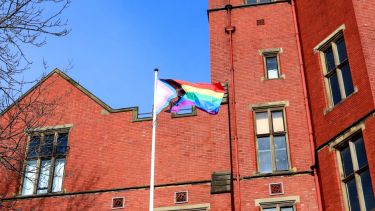In the School of Law we have been keen to mark LGBT+ History month in a way that will be of particular interest and use to those engaged in the study of law. The lists the below as the main aims of the LGBT+ History Month campaign:
- Increasing the visibility of lesbian, gay, bisexual and transgender (“LGBT+”) people, their history, lives and their experiences in the curriculum and culture of educational and other institutions, and the wider community;
- Raising awareness and advancing education on matters affecting the LGBT+ community;
- Working to make educational and other institutions safe spaces for all LGBT+ communities; and
- Promoting the welfare of LGBT+ people, by ensuring that the education system recognises and enables LGBT+ people to achieve their full potential, so they contribute fully to society and lead fulfilled lives, thus benefiting society as a whole.
Our resources list below will provide those interested in the history of law and the LGBT+ community with a good starting point. Some of these films and books are of course already well known, but LGBT+ History month is a great time to revisit these works.
Thank you very much to those members of staff at the School of Law who wrote to us with their contributions to this list.
Books
(Peter Wildeblood)
(James Penney)
(Nicola Barker, Daniel Monk)
(Sally Hines)
(Meg-John Barker and Alex Iantaffi)
(Matthew Todd)
(Salvador Vidal-Ortiz, Brandon Andrew Robison and Christina Khan)
(Chris Ashford, Alexander Maine)
(Eric Cervini)
(Laura A. Belmonte)
(Randy Shilts)
(Mark Gevisser)
(Hannah Dee)
(Shon Faye)
(Sally Hines)
(Sally Hines, Tam Sanger)
(Anna Lvovsky)
For those who are parents or carers of younger people, or who work with younger people, Stonewall has also put together a brilliant list of books for younger readers that are LGBTQ+ inclusive - you can find this . Many of these books for teenage readers feature protagonists who face great hardships due to the government and laws they live under in their countries.
Papers
C. Ashword (2013) ‘Legal Recognition of Same-Sex Relationships in Europe: National, Cross-Border and European Perspectives, 2nd edition, SCOLAG: Legal Journal, forthcoming.
C. Ashford (2011) ‘Gender, Sexualities and Law’, Feminist Legal Studies 19(3) 297-299.
P. Dunne et al, ‘Shifting Sands: Six Legal Views on the Transgender Debate’ (2018, Guardian Online).
E. Grabham, ‘Governing Permanence: Trans Subjects, Time, and the Gender Recognition Act’ (2010) Social & Legal Studies 19(1), pp. 107-126.
H. Hirst ‘The legal rights and wrongs of puberty blocking in England’ in Child and Family Law Quarterly (2021), 33 (2). pp. 115-142. ISSN 1358-8184
Institute of Development Studies, Brighton ‘Gender, Sexuality and Social Justice: What’s Law Got to Do with It?’ (2016)
F. Renz, ‘If the State Decertified Gender, What Might Happen to its Meaning and Value?’ (2016) Journal of Law and Society 43(4), pp. 485-505.
A. Sharpe, ‘Endless Sex: The Gender Recognition Act 2004 and the Persistence of a Legal Category’ (2007) Feminist Legal Studies 15, pp. 57-84.
S. Whittle, ‘The Opposite of Sex is Politics – The UK Gender Recognition Act and Why it is Not Perfect, Just Like You and Me’ (2006) Journal of Gender Studies 15(3), pp. 267-271.
S. Whittle, ‘Transgender people: health at the margins of society’ (2016) The Lancet 388).
Films
If you think of any works that would be good additions to our Law and LGBT+ History resources list, please send an email to law-marketing@sheffield.ac.uk - we'd love to add any suggestions you might have.

